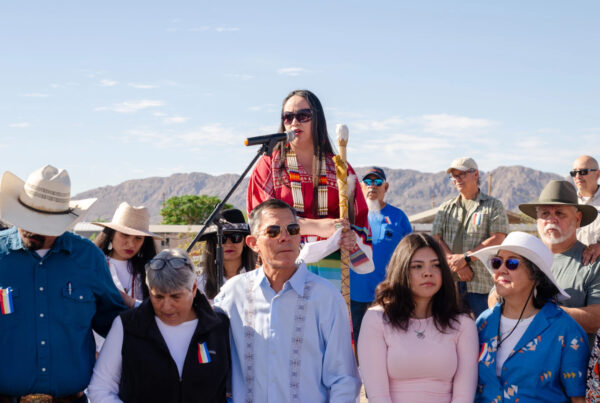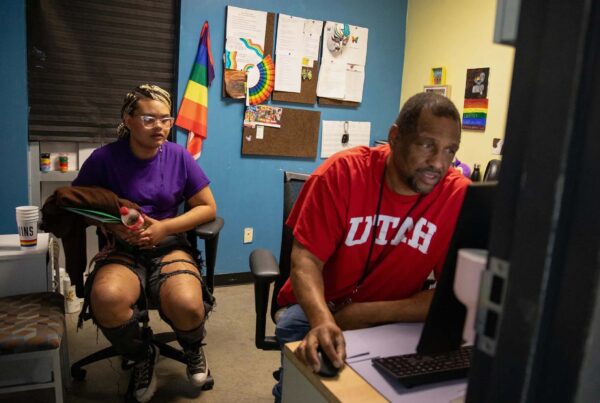Mariachi music, for many in Mexican culture, is a direct line to the emotions at the core of all of us with its powerful vocals and heartstring-tugging lyrics. So of course the world of mariachi music makes the perfect setting for a story about family legacy, making one’s own way and youthful romance.
It’s the premise of the new book, “Canto Contigo” and the third novel from author Jonny Garza Villa. They spoke with the Standard about weaving their culture into their writing and the dichotomy of a story showcasing mariachi music and a queer love story. Listen to the interview above or read the transcript below.
This transcript has been edited lightly for clarity:
Texas Standard: Well, tell us a little about the story and the inspiration behind it.
Jonny Garza Villa: “Canto Contigo,” I like to describe it as sort of half grief novel, half rivals-to-lovers of romance, all about the epic highs and lows of high school mariachi.
It deals with the main character named Rafie Alvarez, who is like the most Leo Sun to ever Leo Sun. Self-described “God’s gift to mariachi,” at the same time he’s seeing his grandfather not being able to perform mariachi anymore, not be able to sing, not be able to play his guitar. And this was the man who introduced Rafie to mariachi and really gave him this gift of music and this big part of what Rafie defines himself as.
As his senior year approaches, his parents drop the news that they are moving to San Antonio. He is not happy about this, mainly because he has to leave his first place nationally-recognized mariachi group for the constantly second place Mariachi Todos Colores and the fictional Selena Quintanilla-Perez Academy in San Antonio.
I love all the names.
Yeah, we had to drop some some color in there.
But yeah, then he thinks maybe the one bright side to this is that they will be begging him to be the lead vocalist of their group, because why not? He’s the best. They’re not.
It seems like easy math, but when he runs into their current lead vocalist, he realizes this is the same boy that he made out with eight months ago. And also a boy who by no means has any intention of giving up his current lead vocalist spot, which sparks this incredible rivalry while they are both obviously crushing on each other.
It’s a journey of like, which one is more important: being center stage, or following your heart?
Well, I mean, let me ask you about that. What do you think is the rival-to-lovers romance story that so many readers really enjoy?
Yeah, same. I think, especially in YA contemporary, there’s so many great rivals-to-lovers stories. I was so terrified of writing one because I’m like, how do I write one that’s so good compared to the ones that I just really love and admire?
I just think like, one: I’m just so attracted to messiness. Like, I think that that maybe is as part of it. We’re just attracted to people who we want to pretend we’re a little smarter than. Like, no. Stop arguing, start kissing. Like it’s so easy. Why aren’t you seeing it?
But then at the same time, like the stress and the building up of it and all of these sort of feelings, I think really just resonate with readers, especially with me. And just by the time we finally hit that lover’s spot, I think maybe it just feels so much more validating, maybe in a way, than just a regular crush that they’re just kind of, you know, very quickly getting into and everything seems perfect.
Not that I don’t love those stories, too. I write those stories, too. But I think there’s just something so specifically validating about getting to see character’s journeys from sometimes maybe a little selfishness, sometimes maybe a little holding in things that they are afraid of sharing with people… All these sort of things that are hidden behind those rivalries that we get to see them open up over the course of a couple hundred pages and learn that receiving love is okay.
» RELATED: Want to get into reading romance? We asked NYT bestselling author Ali Hazelwood for some tips
Well, let me ask you about Rafael. His grandfather, his abuelo, is a key figure in the story, and sort of puts Rafie on his path. Family legacy can be a burden, though, for some young people growing up and trying to grow into their own. What are the complications you wanted to explore here with Rafie?
Yeah, I think I really wanted to build off of what necessarily makes Rafie unlikable to our readers.
A big part of that is the grief that he is really having trouble processing well. I think that that’s a super valid thing, and especially for young readers, I really wanted to write a character who is dealing with grief of a major family member for the very first time in his life, and the fact that, you know, grief at any age isn’t something that I think has to be healthy and has to look clean and put together. I don’t think that’s a very human way of processing grief either.
I’m not here to try to force anyone to love Rafael as a main character. If they find him unlikable the whole time, that’s completely fine. But I really wanted to show the ways in which grief and the ways in which losing family members and thinking that we have to carry their legacy on our shoulders before we recognize that we can just hold them in our hearts. And that is maybe even better.
You know, how that journey looks for some people can be rocky. But that doesn’t necessarily mean that they are less deserving of love.
In your author’s note, you acknowledge how mariachi music, though powerful and a pillar of Mexican culture, is also steeped in tradition and machismo. Your queer characters navigate this in the story. What did you want to show about that dichotomy?
Yeah, I think across my books I am really into celebrating my culture in all the ways that I can, but I love to flip that and showcase the kind of ways in which maybe we fall short a lot of the times, in specific ways.
My first book, machismo was really kind of the reflection on that and my second book, immigration and art. And then this one, I really wanted to focus on mariachi – again, as you said, as a very traditional space, can then be a space that is very queer phobic and very racist and anti-Black at times.
I really wanted to show especially young people being able to take up space when they fall under a queer umbrella, or if they’re Black or white or any of these sort of things. You know, taking up space because they are good enough to be there, and showing that they are good enough to be there, and they don’t have anything to prove to anyone. They can just take up that space because they are from this beautiful community.
You know, I’m not here to solve queer phobia or anything, but I think uplifting young people and showing that they can take up that space is just as powerful.
» RELATED: New documentary dives into the world of high school mariachi competitions
I want to ask you about writing. You said that wasn’t something that you set out to do, but you found yourself writing. Tell us a little bit about that.
Yeah, definitely. I’ve only been writing for about five and a half years now. I’m not someone who necessarily grew up wanting to be a writer. I think I just have sort of filled my life with storytellers, with my family. And so I think even now, I consider myself more of a storyteller and trying to check off the things in which I think storytellers really do write. And then, you know, how can I do that within a sort of professional author kind of way?
But really, what propelled me to just start writing was reading “Simon vs. the Homo Sapiens Agenda” by Becky Albertalli and watching the movie adaptation that came out like about 2017, 2018. As much as I love both of those so much, it made me recognize the fact that young Mexican people, the ones who have families like mine and names like mine, don’t necessarily get that sort of attention.
And I thought, you know, someone should write the book where we can get that sort of attention. And I thought, you know what? Why can’t I do it? So I went in and I did it.












